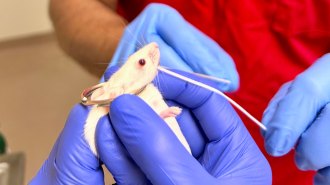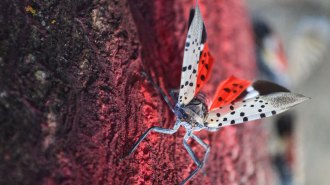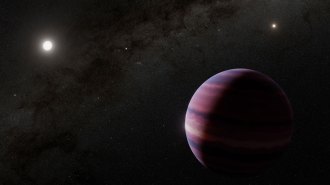News
-
 Health & Medicine
Health & MedicineHow flossing a mouse’s teeth could lead to a new kind of vaccine
Flu viruses often enter the body through mucous tissue in the nose. Researchers are developing new ways to protect such areas.
-
 Life
LifeSquashing the spotted lanternfly problem may require enlisting other species
The invasive spotted lanternfly has spread to 17 states and can threaten vineyards. But bats, fungi, dogs and even trees may help control them.
-
 Health & Medicine
Health & MedicineNew clues emerge on how foods spark anaphylaxis
In two studies of mice, a molecule called leukotriene helped trigger food-induced anaphylaxis. A drug approved for asthma — zileuton — diminished it.
-
 Planetary Science
Planetary ScienceA giant planet may orbit our closest sunlike neighbor
Alpha Centauri A, four light-years from Earth, may host a gas giant. If confirmed, no Earthlike planets orbit in the star’s habitable zone.
-
 Archaeology
ArchaeologyThis ancient Siberian ice mummy had a talented tattooist
Researchers reconstructed a roughly 2,000-year-old woman’s tattoos, from prowling tigers to a fantastical griffinlike creature.
By Celina Zhao -
 Archaeology
Archaeology7 stone tools might rewrite the timeline of hominid migration in Indonesia
Excavated implements suggest a Homo species arrived on Sulawesi over 1 million years ago, before a nearby island hosted hobbit ancestors.
By Bruce Bower -
 Plants
PlantsA newly discovered gene helped this moss defy gravity
A gene called IBSH1 helped spreading earthmoss thrive at high gravity, hinting at how plants adapted to photosynthesize on land.
- Genetics
This snail may hold a secret to human eye regeneration
Golden apple snails can regrow full, functional eyes. Studying their genes may reveal how to repair human eye injuries.
-
 Plants
PlantsThese plants build ant condos that keep warring species apart
The unique architecture of some ball-like plants high in trees in Fiji lets violent ants live peacefully and feed the plant with valuable droppings.
By Susan Milius -
 Artificial Intelligence
Artificial IntelligenceThe U.S. government wants to go ‘all in’ on AI. There are big risks
Government agencies are rapidly adopting AI, but experts warn the push may outpace privacy safeguards and leave data vulnerable to leaks and attacks.
By Ananya -
 Health & Medicine
Health & MedicineWhat is the best exercise to improve sleep?
An analysis of 30 trials delivered a surprising twist: One exercise outperformed walking, resistance training and aerobic exercise in the treatment of sleep disorders such as insomnia.
By Kamal Nahas -
 Health & Medicine
Health & MedicineHigher colon cancer rates may reflect earlier screening success
The recommended age for starting colorectal cancer screening is now 45. That shift may explain a rise in early cases.